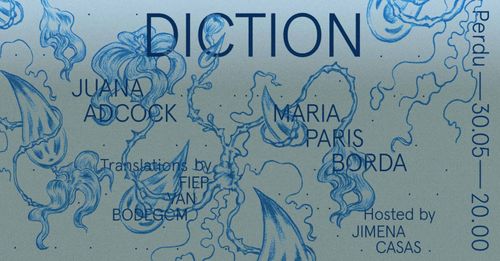Diction

Diction is an evening of performative readings by María Paris Borda, Colombian poet and visual artist based in Amsterdam, and Juana Adcock, a Scotland based-Mexican poet, editor, and translator, with a contribution from Fiep van Bodegom, Dutch writer, critic, and translator, who will read from her recent Dutch translations of Juana’s work. A selection of these translations was published in Terras #26: Magia/No magia.
The event is part of Transatlantic Voices, an ongoing series rooted in bringing visibility to contemporary Latin American poetry in Amsterdam. This series amplifies the voices of feminist and queer poets through workshops, readings, and events, creating a space for resonance and resistance.
Adcock and Borda’s poetics traverse the politics of displacement, writing in bifurcated tongues. Their bilingual selves create dislocated, fractured figures: a wounded language. The female self is split; thinking in a two-headed language expands the dimensions of words—how meaning is perceived through both visual and sonorous corporeality. Language resonates in the body, rehearsing new articulations of the mouth, inverting diction through a shifting sequence of tongues. Who am I in this language?
María Paris Borda presents Overture (I–IV), a concrete poem performance exploring the materiality of words and voice, and the resonance of their phonetic and visual traces. Overture begins with a compact constellation of phrases and gradually unravels into near-silence across multiple iterations. Each version opens a moment while letting others dissolve, tracing how language loops, fades, and fails to arrive.
Overture reflects on the act of returning not as resolution, but as compulsion/composition. The poem turns over the same moment again and again, testing how it might unfold differently, or not at all. The act of returning becomes the structure: of longing, of failed arrival or of time folding in on itself. The poem functions as a score to be translated into a soundscape, where its absences, pauses, and repetitions are reinterpreted as sound, in collaboration with sound artist Constanza Castagnet.
Juana Adcock will be reading from a constellation of poems from her recent collection I Sugar the Bones, Split, Manca and unpublished pieces. The voice in her poems speaks as woman, translator, and migrant poet—recalling the roots of words, reanimating their forgotten meanings. Her hybrid poems move across languages, allowing bilingual selves the possibility to ground themselves and question how language shapes our perception and belonging. She reflects on themes of geopolitics, translingualism, migration, and ecopoetics.
In her practice, she explores approaches to sonority and voicing in language, and how these sounds are embodied—how the mouth is trained to fit around foreign vowels, how inhabiting another tongue distorts articulation, altering one’s sense of identity and presence.
During the Avond at Perdu, she will present a sonorous fabric, weaving the materiality of languages and exploring the porosity and resonance between tongues.
Her poetry also anatomises the violence of her native country, tracing the intersections of language, memory, and material histories.